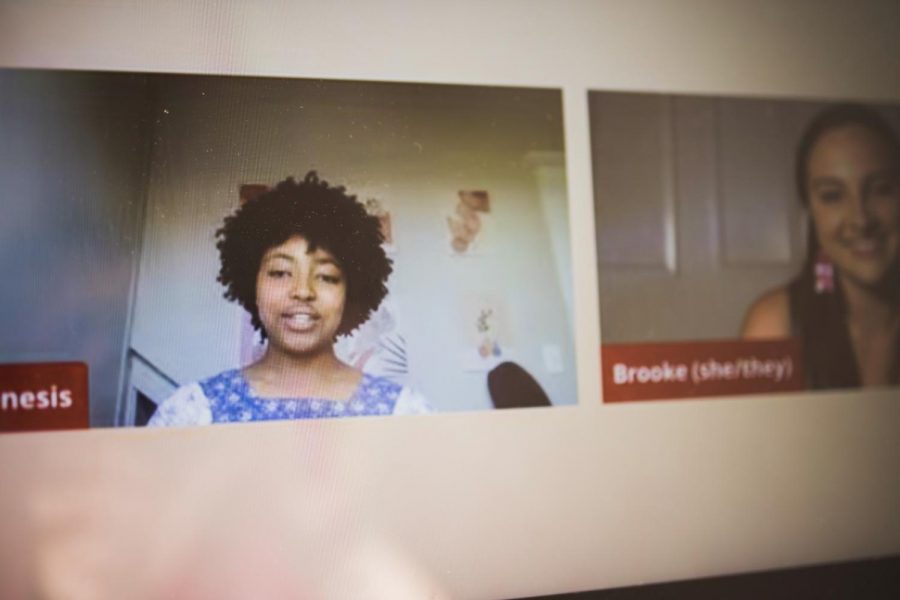Red Night Award Ceremony Celebrates Achievement and Reflection
Among the bevy of virtual events Seattle University offers weekly, Red Night Out stands out for its purpose of celebration and appreciation. The event, held May 14, is a yearly award ceremony created as a way to honor students for their contributions to the Seattle U community and has become a staple event at Seattle U.
This academic school year, it also serves as an acknowledgment of the efforts Seattle U students and on-campus clubs have had to put in to make it through the year. Students and faculty were encouraged to anonymously nominate active members of Seattle U’s community for their exemplary work throughout the year.
In practice, this meant students like fourth-year biology major Andie Carroll, who received the St. Peter Faber Integrity award, won awards that acknowledged their leadership ability and commitment to inclusion. In the past, Carrol was involved in implementing a gender-inclusive housing policy at Seattle U. They’ve followed up that legacy as a student leader by being a diversity, equity and inclusion ambassador in the College of Science and Engineering.
“I didn’t even realize that it was something that I would be recognized for…I’ve been doing the work that I want to be doing at school and I didn’t really realize that someone was keeping tabs on that,” Carrol said.
This type of acknowledgment is exactly what the organizers of the event, Associate Director for Leadership and Government Michelle Kowalcczyk and Graduate Leadership Program Coordinator Elise Whisler, hoped to achieve through Red Night Out.
As the senior organizer, Kowalczyk is passionate about ensuring that students, especially those involved with clubs, have an opportunity to celebrate their “growth and resilience” during this time. She believes that Seattle U’s clubs add a lot of value to the community by connecting with students above other school-organized outreach efforts.
“I call [clubs] the lifeblood of the institution. They have more of a reach for our student population than any one of us will ever have,” Kowalcczyk said.
By dividing the workload, with Whisler considering logistics and Kowalcczyk looking out for the “big picture,” it was simpler for the duo to transition the award ceremony to a virtual platform when Seattle U closed its doors last spring. Their determination was driven by a desire to avoid canceling the event altogether.
“The day the email went out that campus was closing for a couple of months…we hopped on the phone and decided that we have the opportunity to stand for Red Night Out,” Whistler said. “Celebration is a part of intentionality…it’s important to take the time to celebrate and take the time to pause and take joy in the work of Seattle U students and particularly clubs.”
Before being held virtually, Kowalcczyk focused on integrating activities with the theme of gratitude into the ceremony, which encouraged all participating students, including nominees, to celebrate their growth throughout the year.
“That’s who we are when we’re at our best. We’re showing that appreciation, that gratitude and there’s so much to love and celebrate,” Kowalcczyk said.
Though the focus of Red Night Out remains a general celebration of growth rather than victory, students were excited about the acknowledgment of their achievements.
Fourth-year nursing major Lorra Hernon was a recipient of a Spirit of Seattle U Award. She was initially surprised to be considered for the award, especially after learning about the hardships that other award recipients had bypassed in their time at Seattle U.
“It was inspiring, all the adversities that [other recipients] had to overcome, as well to get to where they are now,” Hernon said.
As a transfer student, Hernon used her experiences to improve the College of Nursing in a way that exemplified the award.
Even though she has not been part of the university for long, that did not stop her from integrating herself into the community and quickly becoming a mentor for nursing students and transfer students alike. Hernon was the architect of the new student mentorship program, which allows transfer students to seek out advice from Seattle U students prior to their transfer.
“I would say I’ve always been passionate about inclusion and [developing] a sense of community and making sure that no one feels left out, just because of my prior experiences with school,” Hernon said. “Over the years, I’ve built my confidence and my voice so I wanted to create a sense of community for students and feel like they can have at least one person to talk to.”
Red Night Out was an invitation to look back on a year’s worth of work and reminisce on how far students had come during this time. It was a time to reflect and consider how the community had developed and where Seattle U could go from here.


